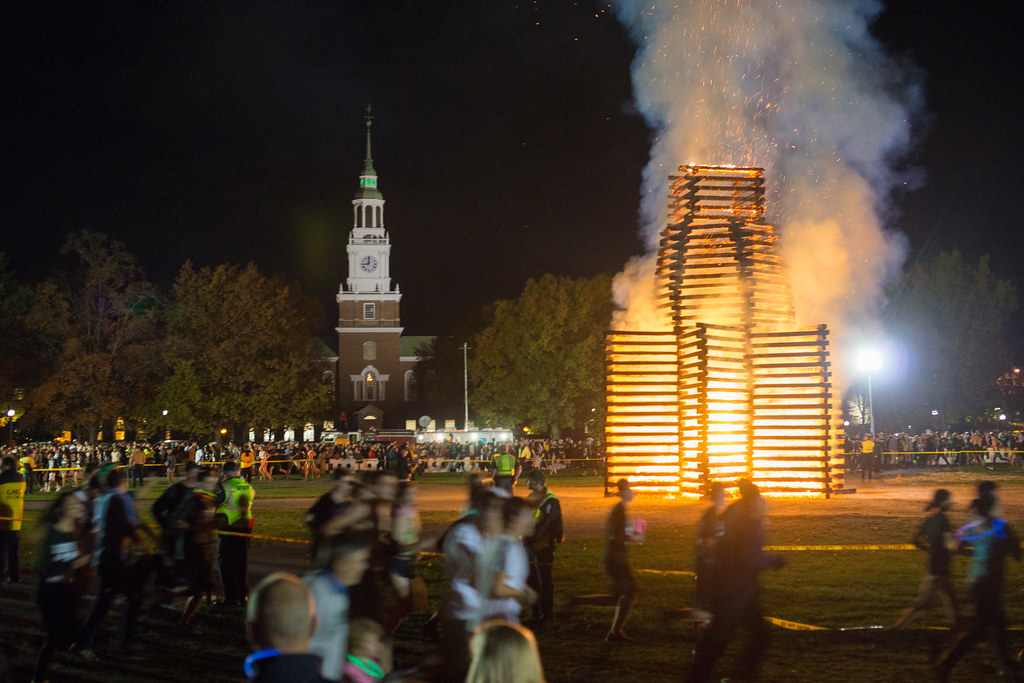
As a member of the class of 2021, I am one of the few students still on campus who has completed the traditional homecoming bonfire run. During my freshman homecoming, my fellow classmates and I ran 21 laps around the bonfire, which corresponded to our graduation year. Several students ran 121 laps, the purest succession of a tradition that began with a single-lap run completed by the Class of 1901. These 121 laps around the sizable bonfire exclusion fence were nearly equivalent to a half marathon. One member of the Women’s Ski Team completed the 121 on crutches.
As the oldest tradition at Dartmouth to persist into the 21st century, I felt tethered to the College’s history running laps in the blistering heat of the fire. It was what Emile Durkheim would have termed collective effervescence, and it lent a sense of wonder to the College. Students were eager to buy into the history and tradition—even ubiquitously-fit Dartmouth students don’t often run half-marathons in jeans and boat shoes on a whim. The current student body is hungry for traditions like these after being starved for them during the pandemic. Unfortunately, in the case of the bonfire run, they will not be allowed to partake.
The Bonfire Run, unlike every other tradition, activity, and pastime, was not canceled due to COVID. Instead, it was canceled in perpetuity following my freshman year due to pearl-clutching hysteria—coming in equal parts from the Dartmouth Administration and the town of Hanover—over the “tradition” of touching the fire.
I use that word in quotes because as a custom that was barely a decade old, it hardly merits the moniker. Beginning in the early 2000s, some freshmen, usually cajoled by older students, would brush their hands against the edge of the fire. With 1000 freshmen running around the bonfire, many in varying states of inebriation, this was reasonably considered a dangerous practice. No one wants an intoxicated 18-year-old, whipped up by older students, to stumble accidentally into an 80-foot bonfire while attempting to touch it. That would be, in a word, bad.
I was in favor of the precautionary measures taken during my freshman year. Between the ring of running freshmen and the bonfire, there were massive traffic barriers, a 6-foot fence, a perimeter of 20 police officers, and a second ten-foot fence nearest the fire. At the time, many students described this as Stalin-esque, but I preferred to view it as a test of agility. No one stumbles over a ten-foot fence. Moreover, how many of the already-small portion of the student body foolhardy enough to touch the fire are physically capable of getting through, or over, these myriad barriers? In my class, the answer was three.
Two of these would be high jumpers, who received three-term suspensions from the College—surely a strong enough message to ward off the vast majority of aspiring fire touchers from future classes. The third fire-toucher was a former Marine fresh off three tours in Afghanistan. At the time he remarked to a mutual friend that, after six years fighting the Taliban, if he wanted to “endanger” himself by touching a bonfire he was well within his rights to do so. Apparently, the Committee on Standards was as compelled by this logic as I was because he got off scot-free.
My homecoming should have been termed a success. The new barriers caused an over 90% reduction in the number of students touching the fire as compared to the previous year. The actual tradition of the bonfire run had been preserved and the imposter tradition of touching the fire curtailed.
But because, much like with COVID, nothing short of total eradication is acceptable, the College ended the tradition of the bonfire run for the Class of 2022. Instead students were shepherded like livestock through a gated course around half of the bonfire by their UGAs. Should any student have the audacity to attempt to jog this half lap, or even to simply walk it a bit too quickly, they will be barked at by the nearest college employee.
In the last four years, much hay has been made over the decision to effectively end the most meaningful tradition of homecoming. The Administration claims that the town of Hanover, who owns the Green, forced their hand in this decision by threatening to bar the College from so much as building a bonfire. The horrendous town-and-gown relations between Hanover and Dartmouth, namly the College’s constant kowtowing to these local bureaucrats is a topic meriting its own article, or perhaps a book. Suffice to say that this level of paternalism, whether it be from the College or the town, is extremely detrimental to the mission of the College. Students need not just access to tradition, but the opportunity to exercise good judgement in practice of these traditions. Total elimination of risk—though particularly in vogue at the moment—is not a reasonable standard by which to hold any tradition or activity. None of real merit will ever measure up.

Be the first to comment on "On Necessary Risks"